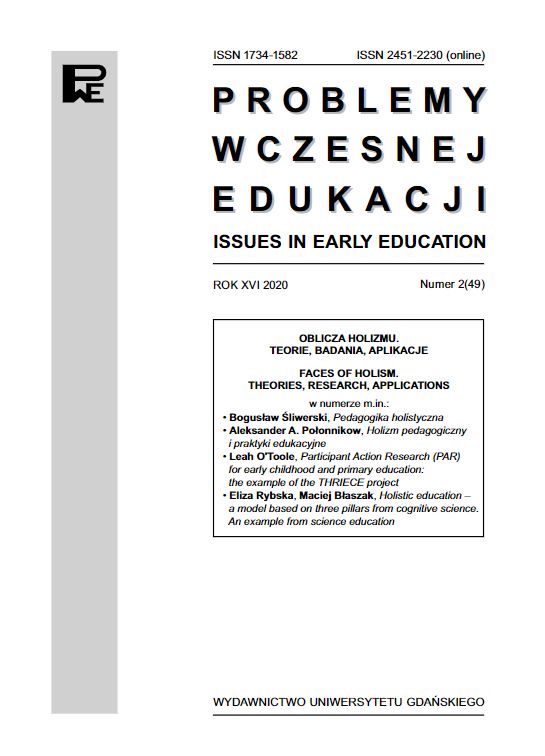Activation of a child’s subjectivity in the upbringing space of free self-determination on the basis of pedagogy of freedom
DOI:
https://doi.org/10.26881/pwe.2020.49.05Słowa kluczowe:
podmiotowość, edukacyjna przestrzeń swobodnego samostanowienia, zasady pedagogiki wolności, elementy środowiska pedagogicznegoAbstrakt
The article updates the problem of reconstruction of the modern upbringing process, the leading idea of which is the targeting of its goals, content, forms and methods at self-development of a child and the becoming of a child’s subjectivity as an active, purposeful, initiative, creative and constructive position in his or her own livelihoods on the basis of humanistic values of a democratic society. The conceptual provisions of the author’s concept of freedom pedagogy have become the starting point in solving the mentioned problem.
There have been defined the psychological and pedagogical conditions for the development of a child’s subjectivity, the realization of which requires the establishing within the educational environment of an educational institution the upbringing space of free determination of a personality as a specially organized pedagogical environment, containing three basic components (spatial, socio-psychological and organizational-pedagogical) and provides opportunities for manifestation of initiative, volitional, creative, self-managerial forms of subjective activities of a personality. The basic approaches to the organization of the upbringing process on the basis of freedom pedagogy have been defined: pedagogy of indirect upbringing influence (directed freedom) and pedagogy of assistance (support).
Downloads
Bibliografia
Abbaniano N. (1992), Ekzistentsiya kak svoboda. “Voprosy philosofii”, 8.
Abulkhanova-Slavskaya K. (1991), Strategiya zhyzni. Moskow, Мysl’.
Ball G. (2011), Osobystist yak modus kultury i yak integratyvnaya kist osoby. “Goryzonty osvity”, 3.
Berdyaev N. (1993), Subiektivizm i individualizm v obschesvennoi philosofii. Moskow, Uchitel.
Bekh I. (2008), Vyhovannya osobystosti. Pidruchnyk dlya studentiv vyschnavchalnyh zaladiv. Kiev.
Boyko A. (2012), Phenomen “subiek-subiekt nividnosyny” – strategiya podalshogo rozvytku pedagogichnoi teotii s practyky. Gumanizatiaya na vchalno-vyhovnogo protsesu. Spetsvypusk 8. Sloviyansks.
Bondarevskaya E. (1999) Pedagogika: lichnoct v gumanno-orientirovannyh teotiyah i sistemah vospitaniya. Rostov na Dony, Utchitel.
Chumak O. (2017), Paradygmaosvity 21th stolittya: innovatsiini aspecty. http://virtkafedra.ucoz.ua/el_gurnal/pages/vyp7/konf1/Chumak.pdf. date of access 07/31/2020.
Fikhte I. (1913), Naznachenie cheloveka. St. Petersburg, Izdanie zhurnala ‘Zhizn’ dlja vsekh’.
Fitsula M. (2009), Pedagogika. Navchalnui posibnyk. Rosdil Teoriya Vyhovannya. https://academiapc.com.ua/product/73; https://stud.com.ua/61108/pedagogika/teoriya_vihovannya, 7.31.2020.
Gibson J. (1979), The Ecological Approach to Visual Perception. Boston, Houghton Mifflin Harcourt.
Khomenko A. (2013), Subiektnist yak providnyi pryntsyp vykhovannya osobystosti. “Zbirnyk naukovuh prats PNPU imeni V.G. Korolenka. Pedagogichni nauky”, 3(59).
Leontiev A. (1975), Activity. Consciousness. Personality. Moscow, Politizdat.
Maslow A. (1971), The farther reaches of human nature. New York, Penguin Books.
Rastrygina A. (2004), Rozvytok teorii vilnogo vykhovahhya y vitchyzhyahii izarubizhnii pedagogitsikintsya 19th – pershoipolovyny 20th stolittya. Dissertation for a scientific degree Doctor of Pedagogical Sciences, Kiev.
Rastrygina A. (2019), Future teacher-musician as a subject of professional and personality development in a university artistic educational space. In: E. Szatan, A. Nowak-Łojewska, A. Komorowska-Zielony (red.), Być nauczycielem, być uczniem w perspektywie jutra. Gdańsk, Wydawnictwo Uniwersytetu Gdańskiego.
Rogers С. (1983), Freedom to learn for the 80’s. Columbus, Charles E. Merrill Publishing Company.
Rubinshtein S. (2003), Being and Consciousness. Man and the World. St. Petersburg, Peter.
Sartr Zh.-P. (1990), Ekzistentsializm – eto gumanizm. Moskow, Sumerki bogov.
van Langenhove L. (ed.) (2010), People and Societies: Rom Harré and designing the social sciences. London, Routledge.
Yaspers K. (1991), Smysl i naznachenie istorii. Moskow, Politizdat. Perevod s nemetskogo. Mysliyeli XX v.
Zyazyun I. (2000) Kontseptualni zasady teorii osvity v Ukraini. “Pedagogika i pcyhologiya profesiinoi osvity”, 1.

 Uniwersyteckie Czasopisma Naukowe
Uniwersyteckie Czasopisma Naukowe





